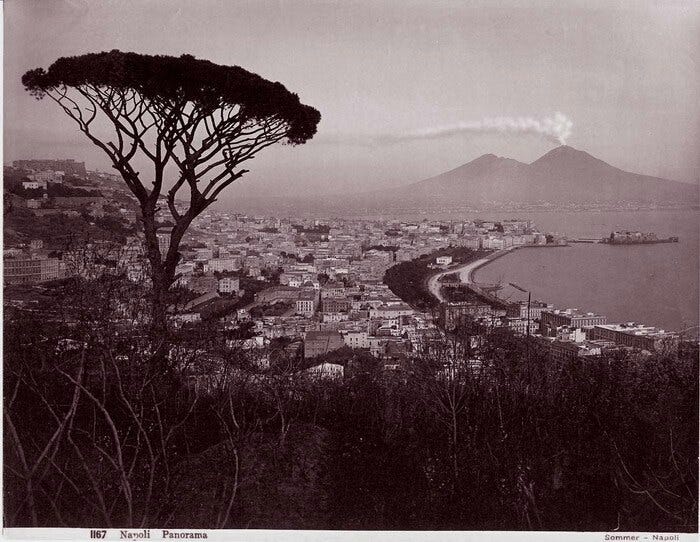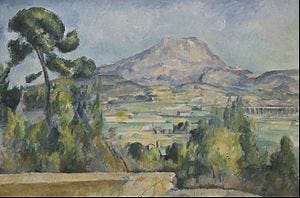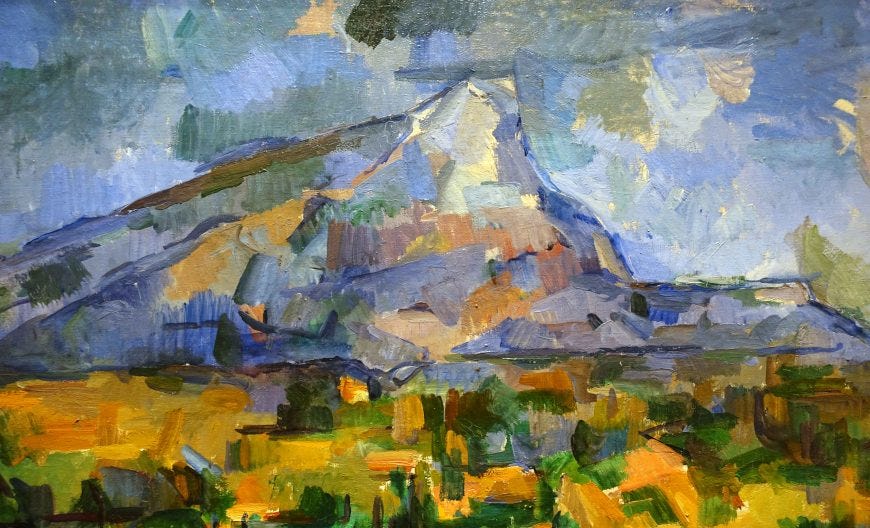Sufjan Stevens’ “Vesuvius” is the final song of our third mix here on our SotD cycles. This is Sufjan’s third appearance here on SotD (see 7-4 & 7-16-23), but only his second on a mix and, indeed, second on this mix. There was a thought that yesterday’s “Over Rainbows and Rainier” would be our final song of the third cycle; that thought was interrupted by “Vesuvius.”
In Canto I of The Inferno, Dante writes:
Midway upon the journey of our life
I found myself within a forest dark,
For the straightforward pathway had been lost.
Ah me! how hard a thing it is to say
What was this forest savage, rough, and stern,
Which in the very thought renews the fear.
So bitter is it, death is little more;
But of the good to treat, which there I found,
Speak will I of the other things I saw there.
I cannot well repeat how there I entered,
So full was I of slumber at the moment
In which I had abandoned the true way.
But after I had reached a mountain’s foot,
At that point where the valley terminated,
Which had with consternation pierced my heart,
Upward I looked, and I beheld its shoulders,
Vested already with that planet’s rays
Which leadeth others right by every road.
Think of “Vesuvius” and the album from which it comes (The Age of Adz, 2010) as Sufjan’s Inferno. After the enormous success of his album Illinois (2005), Stevens’ struggled with both his physical and his psychological health. “Vesuvius” represents the mountain of these struggles for Stevens. We hear him wrestling with the demons in the Inferno of his journey of life throughout the song:
Vesuvius, I am here
You are all I have
Fire of fire, I'm insecure
For it has all been made to plan
Mount Vesuvius is one of the most dangerous volcanoes in the world; 3,000,000 people live in close enough proximity to be affected by an eruption. 3,000,000. In AD 79 an eruption destroyed the Roman cities of Herculaneum, Oplontis, Stabiae and Pompeii.
In literature Vesuvius has its own mythologies. In Rome, Vesuvius was considered a deity of a Genius type, in that it had a divine nature that followed a person from life to death. A divine genius the follows us from life to death.
Vesuvius, are you ghost?
Or the symbols of light? Or of fantasy host?
In your breast I carry the form
The heart of the earth and the weapons of warmth
Stevens’ wrestles with Vesuvius—with God, with the Holy Ghost of God’s being—and the way it follows him upon the journey of his life throughout the record. It is a beautiful reckoning with his artistic vision and his life as an artist. And like Dante, Sufjan writes himself into his poem:
Vesuvius, oh be kind
It hasn't occurred, no it hasn't been said
Sufjan, follow the path
It leads to an article of eminent death
Sufjan, follow your heart
Follow the flame, or fall on the floor
Sufjan, the panic inside
The murdering ghost that you cannot ignore
There is a moment in the process of creation when you touch the divine,—that genius that embodies you from life to death—that Holy Ghost, and it enraptures the artist. It is a divine blessing; you touch Genesis even as you touch Revelation. When others recognize the divinity that has passed through you—as if looking into/through a mirror—that blessing becomes a curse as they ask you to offer them that permeation into the divine again and again.
Cézanne attempted to represent this process as he described his violent motif (see Mont Sainte-Victoire):
You see, a motif is this . . . (He put his hands together . . . drew them apart, ten fingers open, then slowly, very slowly brought them together again, clasped them, squeezed them tightly, meshing them.) That’s what one should try to achieve . . . If one hand is held too high or too low, it won’t work. Not a single link should be too slack, leaving a hold through which the emotion, the light, the truth can escape. You must understand that I work on the whole canvas, on everything at once. With one impulse, with undivided faith, I approach all the scattered bits and pieces . . . Everything we see falls apart, vanishes, doesn’t it? Nature is always the same, but nothing in her that appears to us lasts . . . What is there underneath? Maybe nothing. Maybe everything. Everything, you understand? So I bring together her wandering hands . . . I take something at right, something at left, here, there, everywhere, her tones, her colors, her nuances, I set them down, I bring them together . . . They form lines. They become objects, rocks, trees, without my planning. They take on volume, value . . . But if there is the slightest distraction, if I fail just a little bit, above all if I interpret too much one day, if today I am carried away by a theory which runs counter to that of yesterday, if I think while I paint, if I meddle, whoosh! Everything goes to pieces.
What is there underneath? Maybe nothing. Maybe everything. Everything, you understand?
Do you understand?
Listen to my old friend and mentor H.R. Stoneback:
But in all things . . . if you do not perform the ritual you will not come to know the ecstasy, the grace that it promises.
Now, listen to Michael Jordan describe how and why he played the way he did in The Last Dance:
If you don’t want to play that way, don’t play that way.
But in all things . . . if you do not perform the ritual you will not come to know the ecstasy, the grace that it promises.
I’d like to propose that “Over Rainbows and Rainier” and “Vesuvius” are two sides of the same coin. If we want to play that way, we are being refined by fire through the Inferno of our journey for a promised grace—a grace that is manifested before us in art but that has a greater vision in mind: Paradiso.
But yet the will roll'd onward, like a wheel
In even motion, by the Love impell'd,
That moves the sun in heav'n and all the stars.
"Vesuvius"
Vesuvius, I am here
You are all I have
Fire of fire, I'm insecure
For it has all been made to plan
Though I know I will fail
I cannot be made to laugh
For in life as in death
I'd rather be burned than be living in debt
Vesuvius, are you ghost?
Or the symbols of light? Or of fantasy host?
In your breast I carry the form
The heart of the earth and the weapons of warmth
Vesuvius, the tragic oath
For you have destroyed the elegant smoke
Oracle, I fought him at last
They were the feast of a permanent blast
Vesuvius, oh be kind
It hasn't occurred, no it hasn't been said
Sufjan, follow the path
It leads to an article of eminent death
Sufjan, follow your heart
Follow the flame, or fall on the floor
Sufjan, the panic inside
The murdering ghost that you cannot ignore
Vesuvius, fire of fire
Follow me now, as I favor the host
Vesuvius, fire of fire
Follow me now, as I favor the ghost
Follow me now, or follow me down
Why does it have to be so hard?
As a footnote: "Vesuvius” is sampled in Mac Miller’s “Donald Trump” and Social Club’s “Fade Away.”
About the Song of the Day:
Another form of my favorite form of cycles are song-cycles—song-cycles of great albums, and of course song-cycles of mixes. I have made cycles of mixes for friends for years—Mix-tapes in high-school and college—Mix-cds in grad-school and beyond. Now that cds have lost a bit of their shine in the wake of streaming services, I’ve struggled to find my footing with sharing mixes with friends. My goal here is to share songs that culminate in mixes—one song a day until a mix is completed. I will then post the complete mix and then begin a new cycle.






